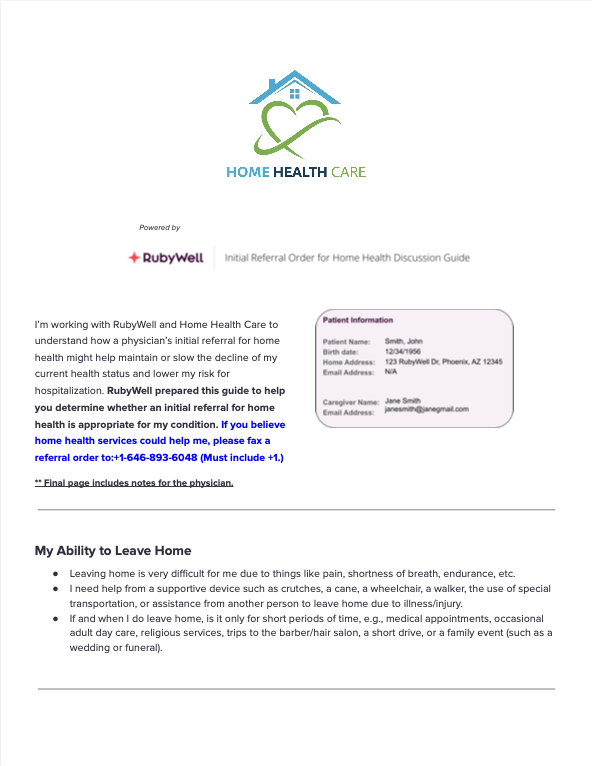
- RubyWell can predict eligibility for the Medicare home health benefit; once predicted, we create a personalized Discussion Guide for each eligible patient to use in conversation with their doctor as they explore available care options
- The Discussion Guide was designed with the help of both clinical and regulatory Medicare experts who know what types of information Medicare requires in order for a physician to be able to consider home health services
- Homebound status, hospitalization risks, and care needs are laid out clearly in the Discussion Guide.
- Gathering and organizing relevant health data can support patients in their conversations with their care teams as they determine whether home health services should be considered as a treatment pathway. If so, it can help the family and physician work together so the patient can access care more quickly.
I don’t know about you, but when my sisters or I have to take our dad to any doctor appointment, we like to show up with a prepared list of health concerns we want to discuss.
Appointment slots seem so short these days — sometimes less than 15 minutes! We want to make sure we get all our questions answered and concerns addressed. It can eliminate the need for time-consuming follow-ups and delays as we try to make sure Dad gets the care he needs.
This M.O. of preparing for doctor appointments has served my family well. And it’s a key component of RubyWell’s process of helping homebound adults on Original Medicare access the Medicare home health benefits they may be entitled to.
We know from first-hand experience that navigating the health system and government benefits for an aging family member or friend can be really hard. We’ve also learned a lot about what it takes to get the care our loved ones need, when they need it.
What is the RubyWell Home Health Discussion Guide?
A key part of RubyWell’s free service for aging adults and their family caregivers is a personalized document we’ve developed called the Home Health Discussion Guide. We create a unique one for every care recipient who we predict may be eligible for the Medicare home health benefit, based on our eligibility screening process.
The idea is that you and the person you care for can bring the Discussion Guide with you to the face-to-face doctor visit that’s required to get a home health referral order. And you can share the entire Discussion Guide with the doctor during your conversation about whether or not home health may be right for your loved one.
We’re seeing the Discussion Guides make it much easier for families to discuss care options with their loved one’s physician, and help them access the care services they need to continue to live safely and comfortably at home.

Anatomy of the RubyWell Home Health Discussion Guide
Our technical partners (both clinical and regulatory) who work with RubyWell helped us design a document that captures all the information that:
- A doctor needs to determine whether home health care is appropriate for a patient
- Medicare requires to determine that the home health services being prescribed and delivered are medically necessary, and therefore covered
We present that information in an easy-to-follow format that makes sense to everyone.

1. Setting context
The first thing the doctor sees on the Discussion Guide is a message letting them know that their patient is working with RubyWell and one of our partner home health agencies. The patient is hoping to understand if home health care might help them manage their health conditions and lower their risk for hospitalizations. And the Discussion Guide is meant to help the doctor determine if a home health referral order may be appropriate.
2. Making a case for home health care
The next three sections of the Discussion Guide provide key data about the patient’s health conditions and care needs that could indicate that home health care is appropriate.
Homebound status
The Discussion Guide lists the reasons that the patient meets Medicare’s definition of homebound.
Hospitalization risk factors
A detailed list of current and recent health challenges lets the doctor assess the patient’s conditions and whether they suggest the likelihood of future ER or hospital visits. This may include information about medications the patient is taking, cognitive abilities, injuries, hospitalizations, etc.
Care needs
To live safely at home, a person has to be able to perform activities of daily living (ADLs). These include dressing, bathing, grooming, toileting, transferring, and eating. The Discussion Guide provides details about all ADLs that the patient needs assistance with.
3. Home health referral order instructions
The final section of the Discussion Guide includes a list of everything that must be included on an Initial Home Health Referral Order. If the doctor believes that home health is appropriate for the patient, this checklist can help them prepare an Initial Home Health Referral Order that the home health agency can accept with no back-and-forth. Because it will have all the supporting information required by Medicare.
Preparation is everything
Families, doctors, and our partner home health agencies are finding that these 3-5 pages of well organized, relevant health data can streamline what can be a slow, clunky, and sometimes frustrating process. RubyWell’s Home Health Discussion Guide gets everyone on the same page and acts as a roadmap that can help:
- Patients access medically necessary home health services faster
- Family caregivers get the care support they deserve faster
- Doctors reduce unnecessary and costly ER visits and hospitalizations for their aging patients
- Home health agencies ensure they have all the documentation necessary for successful Medicare claims
If the person you care for is homebound and covered by Original Medicare, they may qualify for covered home health services. If RubyWell predicts that your loved one may meet Medicare criteria for covered home health, we can prepare a Home Health Discussion Guide they can share with their doctor.
Since our customers are our partner home health agencies who provide the covered care that’s needed, our eligibility screening and Home Health Discussion Guide cost you nothing. You can learn more about how RubyWell helps families of aging adults and take the 10-minute eligibility quiz.










